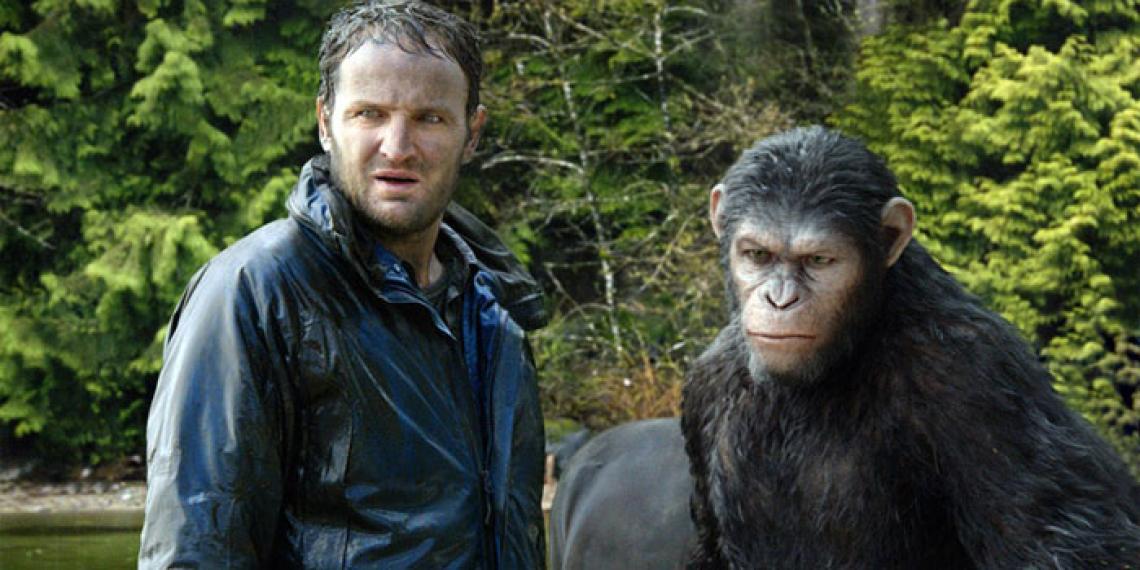You are here
Film review - Dawn of the Planet of the Apes

In Rise of the Planet of the Apes an experimental drug meant to repair and improve brain functions is given to an infant chimpanzee named Caesar who, after he reaches adulthood, uses it to alter his fellow apes so that they can escape from the humans and start their own community. The film ends as that humanitarian vaccine mutates into a ‘Simian Flu’ that sweeps the globe threatening to wipe mankind off the face of the Earth.
In the 10 years since ‘Rise’, Caesar has led a flourishing ape community complete with education, language and infrastructure. At the heart of their civilized society, and a theme which reappears throughout the film, is a simple command etched on a stone wall: ‘Ape Not Kill Ape’. This is basic Ten Commandment- type stuff but it’s also an expression of the trust shared between apes and their common allegiance to Caesar. They have stood witness for a decade of what humans do to one another when confronted with dire circumstances. They choose not to live that way.
Meanwhile, the virus has already taken the lives of untold billions of humans, as few have proved genetically resistant to it. Though satisfied with their flourishing ape family, the curiosity as to the whereabouts of any remaining humans persists. That curiosity is satisfied when a small group of humans led by a man called Malcolm (an excellent Jason Clarke), encounters the apes while searching for a dam that might produce electricity for the humans. This need for the power provided by the dam, alongside the apes’ mistrust of humans sets the stage for some highly tense moments.
Can apes and humans cooperate to survive on a devastated Earth? Many survivors blame the apes for the killer virus, while a few know the truth, and it’s Malcolm’s family that sets out to win Caesar’s trust. Unfortunately, just as there are doubters on the human side, there are many apes, such as Koba, who feel that only war can address the human ‘problem’.
Tensions between the humans inevitably lead to tensions between the apes. In one such scene, Koba asks a younger ape, Ash, to do something unthinkable. Ash says, ‘Caesar wouldn’t want this.’ The film does a terrific job of conjuring feelings of empathy in the viewer for many of the situations these apes find themselves in, and this is one of them. It makes you think of the phrase ‘what would Jesus do?’ This is basically what Ash was saying. He knew what Caesar would do and it wasn’t what he was being asked to do. We’re often confronted with similar, though perhaps less dire circumstances. We know the right thing to do, we know what the Lord would have us do. Do we have the courage to follow through with that? As James 4:17 says, ‘Therefore, to one who knows the right thing to do and does not do it, to him it is sin.’
Later, in a conversation between Caesar and his eldest son, Blue eyes, the latter says ‘Koba say apes should hate humans.’ To which Caesar replies, ‘From humans Koba learned hate, nothing else.’ If you recall, Koba is the scarred ape from Rise that the trainers are instinctually afraid of. He was experimented on and tortured his entire life by humans. That’s all he knew of them. He interpreted this as hatred for him, so he developed a hatred of them. In one scene, Koba points to his various scars and explains how that is what ‘human work’ actually is. He learned how they behaved and he was eager to repay them equally as violently.
Caesar, on the other hand, was raised by humans with love, kindness and compassion. He was taught to be kind to others, so he has a tendency for compassion in most cases, even despite others pleading against that. This can challenge us as Christians to think more about the impact we have on the attitudes of those around us based on how we treat them.
The self-same power-hungry ape Koba cannot understand why Caesar believes in the humans and publicly accuses him when he says, ‘Caesar loves humans more than his own son.’ Yet, this is exactly what our Lord Jesus told us to do: ‘You have heard that it was said, ‘Love your neighbour and hate your enemy.’ But I tell you: ‘Love your enemies and pray for those who persecute you, that you may be sons of your Father in heaven.’ (Matthew 5:43-45)
Dawn of The Planet of The Apes is a surprisingly contemplative film choosing to focus almost entirely on Caesar, his family and the brotherhood of apes that he is trying to foster, and much less on the humans and their plight. This makes it an engaging and surprisingly believable story, which is not your typical futuristic sci-fi fi.
A worthy sequel and one that points at the dark future for humanity that the final film will reveal.
Review by Martin Barratt
Dawn of the Planet of the Apes
Genre: Sci-fi
Director: Matt Reeves (Cloverfield)
Rating: M (violence, mild language)
Run time: 2 hours 10 mins